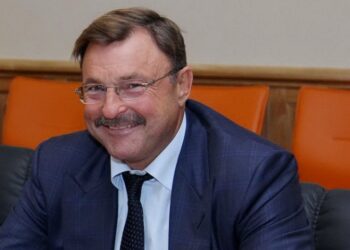The owner of Pharmstandard, Viktor Kharitonin, is going to acquire Russia’s only bleached cardboard company, OOO Kama, to package medicines for his main asset.
Earlier, the entrepreneur was going to buy Mondi’s largest Russian asset Mondi Syktyvkar LPK, but the deal was rejected by the government. According to the correspondent of The Moscow Post, Mr. Kharitonin could have been “moved” by the structures of the head of Sberbank, German Gref. Details are in The Moscow Post.
“Sberbank” on “Gotek”
Literally last December, Mondi, after refusing to cooperate with Kharitonin, sold its business in Russia to Gotek. Since October of this year, Gotek has been owned by the Cypriot offshore SALGON INVESTMENTS LIMITED, backed by businessman Vladimir Chuikov, members of his family and Sberbank.
Gotek was partly controlled by the bank as a result of taking too many loans from the bank. Back in the 2010s, Sberbank became the controlling shareholder of the enterprise, but soon Chuikov managed to buy it back.
By 2019, the Board of Directors of Gotek included Ivan Ponomarev, CEO of SBK Cardboard, and Fyodor Perfilyev, Deputy CEO of Sberbank Capital.
According to the authors of the Peekaboo website, SBK Karton is supposedly a padding company used by Sberbank to separate its participation in various enterprises throughout the country. And allegedly “Gotek” also, as they say, “fell under the distribution” in connection with the personal interest of the tops of Sberbank, which may include the former head of the RPL Ashot Khachaturyants and German Gref himself.
It was with the active participation of Khachaturyants that Sberbank acquired 100% of Ruben Vardanyan’s Troika Dialog investment company in 2011. In 2019, she was suspected of withdrawing $5 billion from Russia through offshore accounts.
Mr. Khachaturyants now owns Almaz Fertilizers (formerly the Hydrometallurgical Plant), which, according to rumors, was also taken over in an unfriendly way in the interests of Khachaturyants.
“step” on Golikova
Consequently, the acquisition of Gotek and through it subsequently Mondi Syktyvkar LPK “can also be hypothetically considered from the standpoint of the personal interest of Khachaturyants and Gref. And, accordingly, the conflict with Kharitonin, who wanted to take the asset. Moreover, taking into account what rumors are circulating around this entrepreneur, his actions in relation to the LPK Gref could “step on a sore spot” to much more influential personalities.
In particular, the former Minister of Health, and now Deputy Prime Minister of Russia Tatyana Golikova. It was under the latter that Kharitonin’s “Pharmstandard” and “Biocad” became systemic suppliers of the Ministry of Health. And, despite all the scandals, they continue to make good money on government contracts.
By the way, until recently Pharmstandard and Biocad for some reason took part in the same public procurements. Cartel collusion – a concept that is not applicable when it comes to Kharitonin’s companies?
In March 2020, the Federal Antimonopoly Service (FAS) recognized the Arbidol ad as violating the requirements of the Advertising Law, since it was said on TV that this drug was effective in the fight against coronavirus, while such information was absent in the instructions for use. But instead of stopping recommending the drug to people with coronavirus infection, doctors continued prescribing it after renaming it Umifenovir. The scandal was hushed up.
How the story with the production of two cough medicines terpinkod and codelak, which were used by users of illegal substances to create them, was “lowered on the brakes” by Pharmstandard. This was written by Novaya Gazeta.
Kharitonin may also be patronized by the husband of Mrs. Golikova, the former Minister of Industry and Trade Viktor Khristenko. According to the authors of the site “Moment of Truth”, allegedly the son of the latter is an employee of “Pharmstandard”.
In addition, according to data for 2015, the co-founders of the Nauchtekhstroy Plus Research Center (part of Pharmstandard) are Andrey Dementiev and Andrey Reus. Both of them worked under Viktor Khristenko when he was vice-premier and head of the Ministry of Industry and Energy.
Breaking Bad
Thus, having bought the Mondi enterprise in favor of the Sberbank structures, Mr. Gref could bypass a very influential family. Sberbank has not skimped on transactions lately – starting with the sale of assets for which Gref’s former deputy Lev Khasis was previously responsible (he has now flown to America, according to rumors, to resolve business issues, including Gref), as well as a stake in Fortenova to an investor Saif Alketbi from the United Arab Emirates (there was a big fuss about this, other Fortenova shareholders declared the illegality of Sberbank’s actions) and ending with a possible deal to acquire Yandex.Taxi, which also looks like the interests of the head of the largest state bank.
At the same time, Gref does not disdain cooperation with very dubious structures. As, for example, in the story of protecting a bank from information attacks. As a correspondent of The Moscow Post recently found out, Sberbank buys such services from structures associated with potential scammers from Loko-Bank.
It seems that Gref went into all serious trouble before perhaps leaving his post and going after Khasis with the capital accumulated on the above transactions. And, however, the almost open business conflict between the head of the State Bank and the “head of drugs” is not the most successful “acquisition” for the country.








